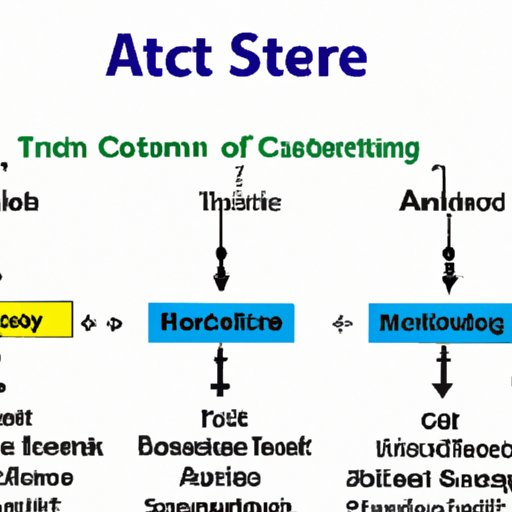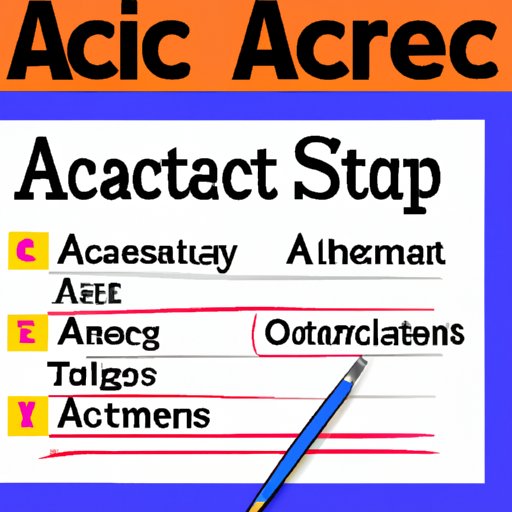Introduction
The ACT Science section is one of the most challenging parts of the exam. With only 35 minutes to answer 40 questions, it can be difficult to finish all of the questions in time. This article provides tips and strategies to help you improve your ACT Science score.

Understand the Structure of the ACT Science Section
The ACT Science section consists of 40 multiple-choice questions that test your knowledge of scientific reasoning skills. The questions are based on 7 sets of passages, which may include tables, graphs, diagrams, and other visual displays. You will need to interpret these passages in order to answer the questions correctly.
There are three types of questions on the ACT Science section: data representation, research summaries, and conflicting viewpoints. Data representation questions ask you to interpret information presented in a table, graph, or diagram. Research summaries require you to interpret the results of an experiment. Conflicting viewpoints questions ask you to evaluate two different hypotheses.
Practice Taking Timed Practice Tests
One of the best ways to prepare for the ACT Science section is to take timed practice tests. This will give you an idea of how much time you have to answer each question and how quickly you need to work. It will also help you identify areas where you need more practice.
You can find free online ACT practice tests or purchase a study guide with practice tests. Make sure to set aside enough time for a full-length practice test and make sure there are no distractions. Take notes on any areas that you struggle with so that you can focus on them during your next practice test.
Use a Variety of Study Aids and Resources
In addition to taking practice tests, there are a variety of study aids and resources available to help you prepare for the ACT Science section. Examples include flashcards, websites, books, and tutoring services. These resources can help you review key scientific concepts and provide guidance on how to approach and answer questions.
It is important to use these resources effectively. Make sure to set aside enough time to review the material and practice answering questions. Additionally, it can be helpful to create a study plan that outlines specific goals and tasks for each day.
Review Basic Scientific Concepts
In order to do well on the ACT Science section, it is important to review basic scientific concepts. This includes topics such as biology, chemistry, physics, and earth science. It is also important to understand scientific terminology and how to interpret tables, graphs, and diagrams.
You can access free online resources to review these concepts. Websites such as Khan Academy and Quizlet offer tutorials and practice questions. Additionally, you can purchase textbooks or review books to supplement your studies.

Familiarize Yourself with the Types of Questions on the ACT Science Test
It is important to familiarize yourself with the types of questions on the ACT Science section. As mentioned before, there are three types of questions: data representation, research summaries, and conflicting viewpoints. Knowing what type of question you are dealing with can help you answer it more quickly and accurately.
Additionally, there are certain strategies that can help you answer each type of question. For example, when answering data representation questions, it can be helpful to draw a diagram of the information provided. When answering research summaries questions, it can be helpful to identify the main idea of the passage. Finally, when answering conflicting viewpoints questions, it can be helpful to identify the similarities and differences between the two hypotheses.
Utilize Strategies to Help You Answer Questions Quickly and Accurately
In order to maximize your score on the ACT Science section, it is important to utilize strategies to help you answer questions quickly and accurately. This includes reading the questions carefully, eliminating wrong answers, and using process of elimination. Additionally, it can be helpful to read the passage first and then answer the questions.
It is also important to practice using these strategies. You can practice by taking timed practice tests or by completing sample questions. Additionally, some websites offer quizzes that test your knowledge of scientific concepts and your ability to apply strategies to answer questions.

Take Breaks While Studying in Order to Stay Focused
Studying for the ACT Science section can be overwhelming, especially if you are trying to cram for the test. To stay focused and motivated, it is important to take breaks while studying. This can help you stay energized and break up long study sessions.
Taking breaks can also help keep you from getting frustrated. Consider setting a timer for 30 minutes and taking a 10 minute break after each session. During your break, you can do something unrelated to studying such as going for a walk or listening to music.
Conclusion
Improving your ACT Science score takes dedication and hard work. It is important to understand the structure of the section, practice taking timed practice tests, use a variety of study aids and resources, review basic scientific concepts, familiarize yourself with the types of questions on the ACT Science test, and utilize strategies to help you answer questions quickly and accurately. Additionally, it is important to take breaks while studying in order to stay focused and motivated.
With the right strategies and preparation, you can improve your ACT Science score.
(Note: Is this article not meeting your expectations? Do you have knowledge or insights to share? Unlock new opportunities and expand your reach by joining our authors team. Click Registration to join us and share your expertise with our readers.)
